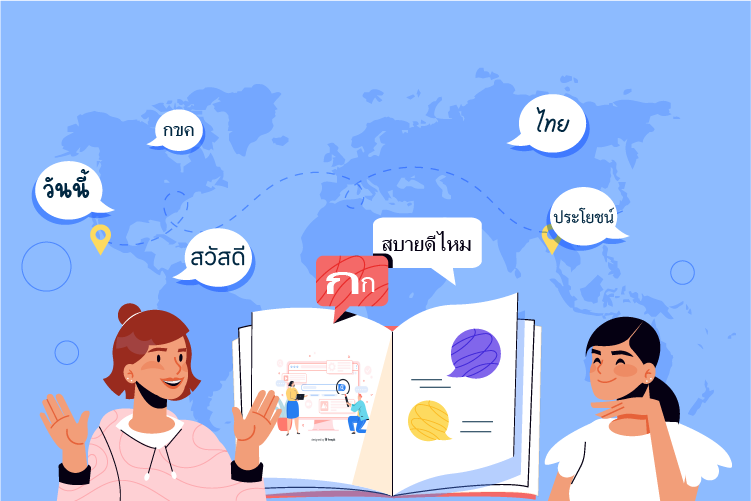In the vast realm of digital marketing strategy, guest posting stands out as a powerful tool, pivotal in enhancing a brand’s visibility and authority. Essentially, guest posting is the practice of contributing content to another person’s website or blog, aiming to build relationships, exposure, and, most importantly, inbound links that can boost referral traffic. In the context of Search Engine Optimization (SEO), these backlinks are invaluable, serving as endorsements that boost a website’s credibility in the eyes of search engines.
But beyond the global perspective, there’s a burgeoning digital landscape that’s often overlooked: Thailand. With its rapidly growing online audience and unique cultural nuances, the Thai digital space offers a plethora of opportunities for brands and marketers. Guest posting on Thai websites, therefore, isn’t just an option—it’s a strategic imperative.
Why Guest Posting in Thai Websites Matters
According to Statista, Thailand’s internet penetration rate stood at 57.5% in 2019 and is projected to soar to 85.03% by 2028.
Thailand, celebrated for its vibrant culture and picturesque landscapes, is rapidly establishing itself as a digital hub in Southeast Asia. This digital embrace spans e-commerce, social media, online education, and entertainment. As the Thai community delves deeper into the digital world, it presents a golden opportunity for marketers.
Benefits of Targeting a Thai Audience

The benefits of guest blogging in the Thai digital space comes with a plethora of advantages. Firstly, there’s the sheer volume of the audience, offering a vast potential customer base. But more than numbers, it’s the unique characteristics of Thai netizens that make the difference:
- Cultural Engagement: Thai users are deeply rooted in their culture, and content that resonates with their traditions and values often sees higher engagement.
- High Social Media Penetration: Platforms like Facebook, LINE, and Instagram are immensely popular, offering brands multiple touchpoints to connect with their audience.
- Trust in Authentic Content: Thai consumers place a high value on authenticity. Guest posts, especially those that offer genuine value and insights, can help build trust and establish brand authority.
In essence, guest posting in Thailand is more than just a link-building exercise. It’s about forging genuine connections, understanding cultural nuances, and positioning your brand in a market that’s ripe with opportunities.
Best Practices for Guest Posting

Researching the Right Platforms:
Before diving into guest posting, it’s imperative to identify platforms that align with your brand’s objectives and audience. Start by listing websites that cater to your niche and have a significant Thai readership. Tools like SEMrush or Ahrefs can provide insights into a website’s traffic, domain authority, and backlink profile, helping you make informed decisions.
Understanding the Audience of the Platform:
Once you’ve shortlisted potential platforms, delve deeper into their audience demographics. What age group do they cater to? What are their interests and preferences? Platforms might offer analytics or audience insights, but even a cursory glance at the comments section or social media engagement can provide valuable clues. Tailoring your content to resonate with the platform’s audience increases the chances of your guest post being accepted and engaged with.
Crafting High-Quality, Relevant Content:
Quality is paramount when it comes to guest posting. Ensure your content is well-researched, offers genuine value, and isn’t just a rehash of existing information. Incorporate relevant keywords naturally, ensuring the content is SEO-friendly but not overly optimized. Remember, your primary goal is to provide value to the readers, not just secure a backlink.
Ensuring Cultural and Linguistic Appropriateness:
Thailand, with its rich cultural tapestry, requires a nuanced approach to content creation. Ensure your content respects local customs, traditions, and sensibilities. If writing in Thai, it’s advisable to collaborate with a native speaker or use professional translation services.ThaiSEOLinks ensures linguistic accuracy and cultural relevance by leveraging native speakers and professional translation services.
Importance of LSI (Latent Semantic Indexing) in SEO:
Furthermore, LSI (Latent Semantic Indexing) keywords, which are terms related to your main topic, help search engines understand your content’s context, optimizing its reach. As AI-driven Natural Language Processing (NLP) evolves, it’s reshaping search rankings by prioritizing content that mirrors user intent. When crafting guest posts, seamlessly integrating LSI keywords and aligning with NLP principles ensures your content is both reader-centric and SEO-optimized.
Pro tip:The “People Also Ask” section on search engines provides a window into user intent, showcasing prevalent questions. Addressing these questions in your guest post enhances its relevance and aligns with user intent.
Guest Posting Opportunities in Thailand
- Overview of Top Thai Websites Accepting Guest Posts:
Thailand boasts a diverse digital landscape, filled with guest post opportunities, from tech blogs to travel websites. Some prominent websites that accept guest posts include Bangkok Post, ThaiTech, and Thailand Starter Kit. However, always check their guest post guidelines and previous guest articles to gauge the content quality and style they prefer. - Niche-Specific Platforms and Their Benefits:
Beyond the mainstream websites, there’s a plethora of niche-specific platforms in Thailand. For instance, if you’re in the travel industry, websites like ThaiWebsites or Tieland to Thailand might be more relevant. These niche platforms offer a targeted audience, ensuring your content reaches readers genuinely interested in your domain. Moreover, niche platforms often have a dedicated and engaged cmunity, leading to higher engagement rates and more meaningful interactions.
Crafting the Perfect Pitch

Understanding the Platform’s Guidelines:
Before sending out your pitch, it’s crucial to familiarize yourself with the platform’s guest posting guidelines. These guidelines often provide insights into the type of content, its style, length, format, and other specifics the platform prefers. Adhering to these guidelines not only increases the chances of your pitch being accepted but also showcases your professionalism and respect for the platform’s standards.
Personalizing Your Pitch:
Avoid generic, one-size-fits-all pitches. Take the time to personalize your pitch for each platform. Mention any specific articles from their site that you found insightful or align with your proposed topic. This demonstrates that you’ve done your homework and genuinely value the platform’s content.
Highlighting the Value You Bring to the Platform:
Your pitch should clearly articulate the benefits the platform will gain from your guest post. Whether it’s a fresh perspective, in-depth research, or a topic that hasn’t been covered extensively on their site, make sure to highlight what sets your content apart and why it would be valuable to their readers.
Conclusion
Publishing a guest blog post in the Thai digital landscape offers a unique opportunity to reach a growing and engaged audience. As the digital realm in Thailand continues to expand, the importance of crafting high-quality, relevant, and SEO-optimized guest posts cannot be overstated. By understanding the intricacies of the Thai market, respecting cultural nuances, and leveraging SEO best practices, brands and individuals can effectively position themselves as thought leaders in their respective niches. The journey of guest posting is as much about proactive outreach as it is about consistent quality content creation. Embrace the challenge, and the rewards will follow.
For expert assistance and to become a successful guest blogger in Thailand, contact ThaiSEOLinks. Our team is dedicated to ensuring your content not only reaches the right platforms but also resonates with the Thai audience. Let’s collaborate and make your brand’s voice heard!
